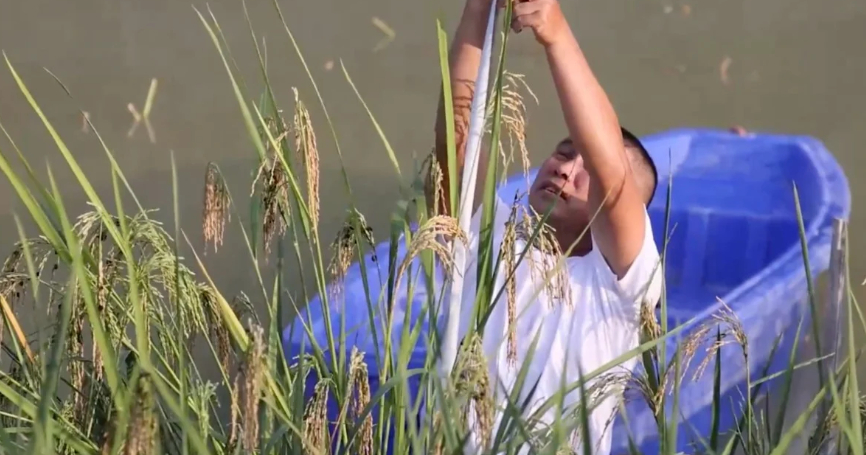May 29, 2025 | 16:12 GMT +7
May 29, 2025 | 16:12 GMT +7
Hotline: 0913.378.918
May 29, 2025 | 16:12 GMT +7
Hotline: 0913.378.918

China’s latest giant-rice harvest took place in challenging soil conditions in Guizhou province. Photo: Xinhua
China has cultivated its second harvest of genetically modified giant rice in a mountainous region with poor soil, with greater results, and Beijing is hailing the achievement as progress in its efforts to bolster food security amid soaring global rice prices.
The high-yielding home-grown strain of rice, which grows about twice as tall as ordinary rice, was recently harvested at trial farms in southwest China’s Sanzhou county, Guizhou province, the state’s Xinhua reported on Thursday.
In the area famous for its karst landscapes and challenging soil conditions, the yield reached 12.6 tonnes per hectare (11,243 pounds per acre), according to a Xinhua interview with a local farmer who had volunteered to grow the experimental variety. It marked a 5 per cent increase from 12 tonnes per hectare last year.
The party mouthpiece said the giant-rice harvest in such conditions has “great significance for elevating food production and ensuring food security”.
Beijing has been ramping up efforts to increase food production in the face of climate change, supply-chain upheavals and turbulent geopolitical tensions – all of which threaten food security. In March, President Xi Jinping called agriculture a “ national security issue of extreme importance”.
The 12.6-tonne yield from this year’s giant-rice harvest in Guizhou was also nearly 1.8 times greater than the average Chinese rice yield in 2022, which stood at 7.1 tonnes per hectare, according to the National Bureau of Statistics.
This giant-rice variety was developed in 2017 by the Institute of Subtropical Agriculture at the Chinese Academy of Sciences. Its stalks can reach around two metres tall, and it is more resistant to pests and flooding, according to the institute.
This salt-tolerant giant rice could also serve as a natural habitat for some agricultural aquatic species that help increase soil fertility and reduce the use of chemical fertilisers, the institute’s chief researcher, Xia Xinjie, was quoted as saying by the state-backed Economic Daily last year.
The home-grown rice strain has been cultivated in 22 regions across China, including the provinces of Hainan, Heilongjiang and Guangdong, and Chongqing municipality, the Economic Daily said.
China’s Ministry of Agriculture and Rural Affairs vowed in April to increase rice exports by 24 per cent in the next decade – a move that could affect exporters in major rice-production regions such as Thailand and Vietnam.
Global rice prices have been higher in recent months, driven by export restrictions from main exporters such as India, while climate-related uncertainties and international conflicts have triggered stability concerns in the market.
According to the Food and Agricultural Organization of the United Nations, the global rice-price index in September was up 27.8 per cent, year on year.
(SCMP)

(VAN) Vikas Rambal has quietly built a $5 billion business empire in manufacturing, property and solar, and catapulted onto the Rich List.

(VAN) Available cropland now at less than five percent, according to latest geospatial assessment from FAO and UNOSAT.

(VAN) Alt Carbon has raised $12 million in a seed round as it plans to scale its carbon dioxide removal work in the South Asian nation.

(VAN) Attempts to bring down the price of the Japanese staple have had little effect amid a cost-of-living crisis.

(VAN) Fourth most important food crop in peril as Latin America and Caribbean suffer from slow-onset climate disaster.

(VAN) Shifting market dynamics and the noise around new legislation has propelled Trouw Nutrition’s research around early life nutrition in poultry. Today, it continues to be a key area of research.

(VAN) India is concerned about its food security and the livelihoods of its farmers if more US food imports are allowed.